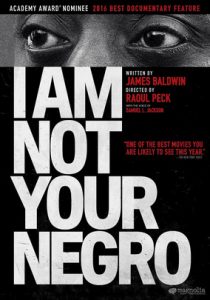I Am Not Your Negro-2016
Director Raoul Peck
Starring Samuel L. Jackson
Scott’s Review #674
Reviewed August 19, 2017
Grade: B
I Am Not Your Negro, a 2016 documentary created by director Raoul Peck, chronicles an unfinished manuscript written by social critic James Baldwin, entitled Remember This House.
The memoir is a series of recollections by Baldwin, who died in 1987, of his experiences with famous civil rights leaders Malcolm X, Martin Luther King, Jr., and Medgar Evers.
Released in a year that saw similarly racially themed documentaries emerge, such as 13th and O.J.: Made in America, all were recognized with award nominations in several year-end ceremonies.
If comparisons are drawn, 13th, the most similar in theme to I Am Not Your Negro, is the superior piece. While interesting, the latter did not quite grip me as much as the former.
Still, I Am Not Your Negro is worth a watch if nothing else than to understand and be exposed to the continuing battle for racial equality in the United States.
The documentary revolves around the discussion and backstory of all the leaders mentioned. Old footage of each man is used for location shots and speeches.
A high point is Baldwin’s interview and his insight into his racial experiences, both positive and negative. Each leader, King, X, and Evers, receives roughly the same amount of screen time, and the best part is Baldwin’s dealings with each man.
I immensely enjoyed the multitude of scenes featuring racial history in cinema, and the harsh reality is that blacks have not been given their due until relatively recently in how their characters are portrayed.
As recent as the 1950s and 1960s, and arguably later than that, blacks were demeaned or treated as nothing more than secondary characters. Worse yet, some were portrayed for laughs or as caricatures.
A startling admission comes from Baldwin himself. An enormous John Wayne fan as a child, reveling in the joy of his films, it was a harsh reality to understand that the Indians in Wayne films, seen as the “bad guys,” were Black Americans, therefore himself.
Baldwin’s films were viewed through the innocent eyes of a child, but real life was harsher.
Samuel L. Jackson’s narration is unnecessary. Being a well-known name, the actor is distracted from the message. Jackson seems to read Baldwin’s words as if he were acting, and Baldwin and Jackson are two very different types of men, so the result is disjointed.
The most important takeaway that I Am Not Your Negro left me with is a crucial one. A better understanding of the historical plight of Black Americans and how far the United States has come in better racial equality.
Even more important, however, is the realization that we still have so much work ahead of us as a nation to ensure even better race relations, and this is a sobering message.
Oscar Nominations: Best Documentary-Feature
Independent Spirit Award Nominations: Best Documentary Feature
